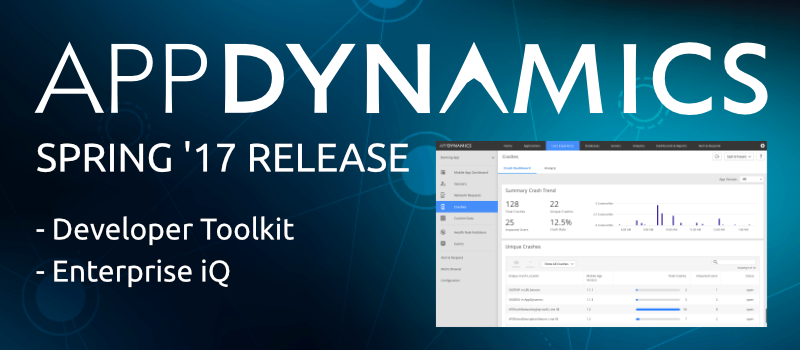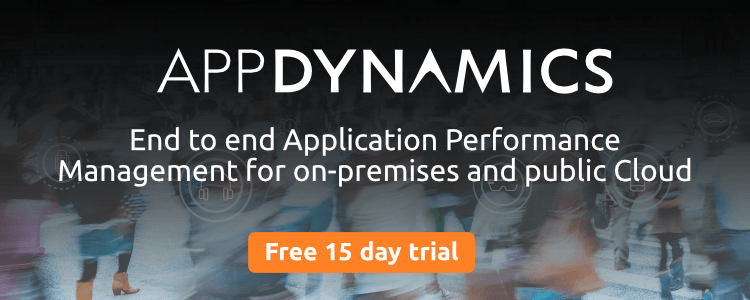AppDynamics Spring ’17 release adds features for Developers and Enterprises

AppDynamics Spring ’17 release (also know as version 4.3) brings many new capabilities to visualise the end-to-end performance of your application: from touch, to code, to infrastructure. There is a new Developer Toolkit to embed AppDynamics across the different stages of the software development lifecycle. And there are new Enterprise IQ features to cope with the scale and complexity of modern distributed, heterogeneous application environments. The release includes new supported languages and frameworks such as Xamarin, Android Studio and Go.
The AppDynamics Spring ‘17 release was already in the works prior to the Cisco acquisition earlier this year and continues to push AppDynamics forward as the leader in the Application Performance Management space. Cisco confirmed that the current 12 month roadmap for AppDynamics will continue unchanged although Cisco and AppDynamics have hinted at deeper integrations between AppDynamics and the Cisco network management tools and we might start to see some of these development later this year.
Developer Toolkit
Developer Toolkit gives deep diagnostics, from user gesture to code to infrastructure. It enables developers to understand how their users behave, make critical improvements, and improve business results. You can now instrument your end-user applications more easily, analyse user sessions, and fix crashes so you can improve customer retention and deliver better user satification. Here are some of the new features:
-
User Sessions
- See exactly how much time a user spends on each view in both browser and mobile applications. For mobile apps, track UI events such as button tap and text field focus as well as system events such as switching off wifi and app crash. Quickly filter session data by geography, browser version, app version, device type, operating system, and much more.
-
Crash reporting for Apps
- Developers can receive new crash alerts, get crash summaries at a glance, filter crashes by app version, and dive deep into unique crash groups. When viewing crash logs, see exactly which line of code caused the crash without scanning the entire log.
-
Mobile Scorecard
- Focus on the apps that need more attention. Mobile Scorecard shows you key statistics for each of your mobile applications including crash rate, app opens per min, average network request time, HTTP error rates, and more.
-
Xamarin and Android Studio integrations
- Mobile instrumentation is now even easier with a brand new Android Studio plugin which makes Android instrumentation a breeze and a new Xamarin plugin for easy Xamarin instrumentation.
Enterprise iQ
Enterprise iQ enhancements allow AppDynamics to be more easily implemented and managed at massive scale. It makes it easy for admins to manage agent instrumentation, licensing, configuration, and access control across thousands of agents in complex multi-cloud environments. Here are some of the new features:
- Universal Agent
- The new Universal Agent will automatically detect applications and services running on a host machine. It then pulls down configuration commands that automatically provision the correct agents for every application and service running on the host. A REST API can used to manage and update many agent in bulk.
-
Live Mode
- Live Mode allows admins to view live traffic running through the application to ensure Business Transaction configuration rules are set correctly.
-
Scopes and License Management
- Scopes allow you to group tiers and nodes together to simplify the application of configuration and transaction detection rules.
- License Management allows admins to assign access keys to different teams within their organisations, visualise their license usage and move licenses between teams as required.
-
Role-based fine-grained access control
- Create roles for specific groups or user levels. Admins can then fine tune access to different resources within AppDynamics such as apps, analytics, and databases.
For more information about this release, see the Release Notes.
Or if you would like a conversation about how AppDynamics can help your business then contact Application Performance who would be delighted to discuss your requirements and set up a personalised demonstration.

